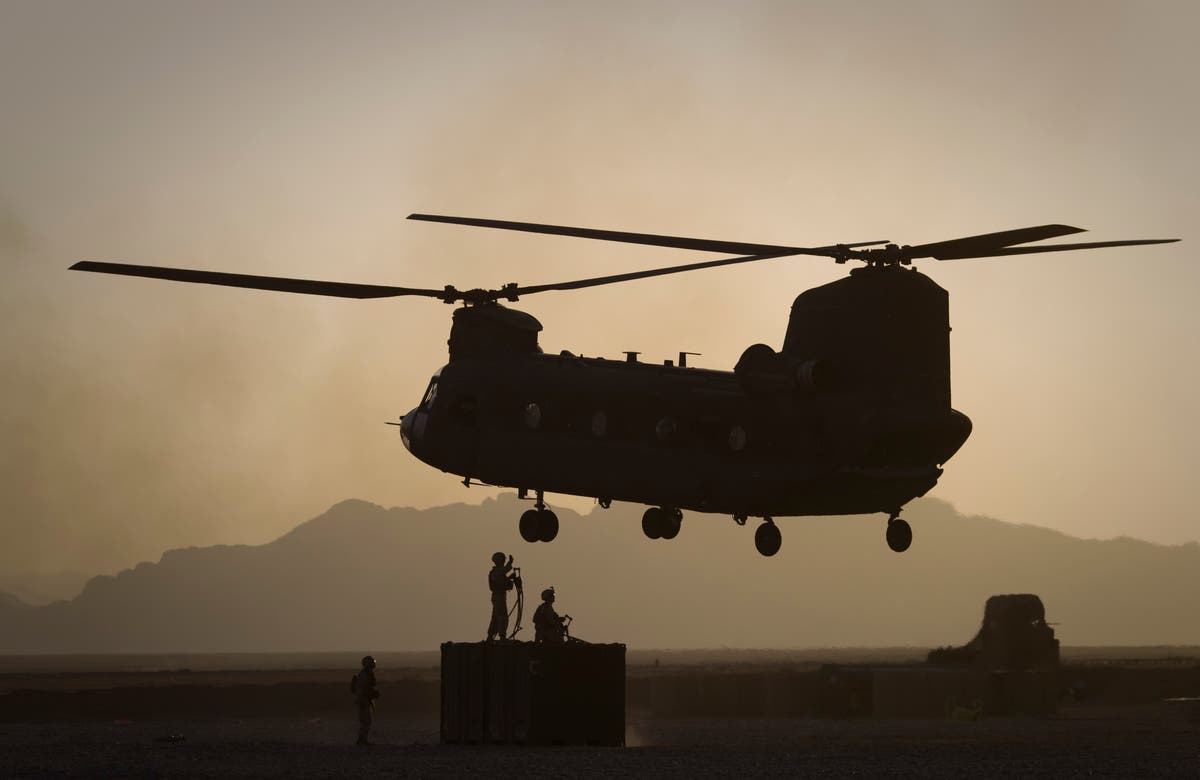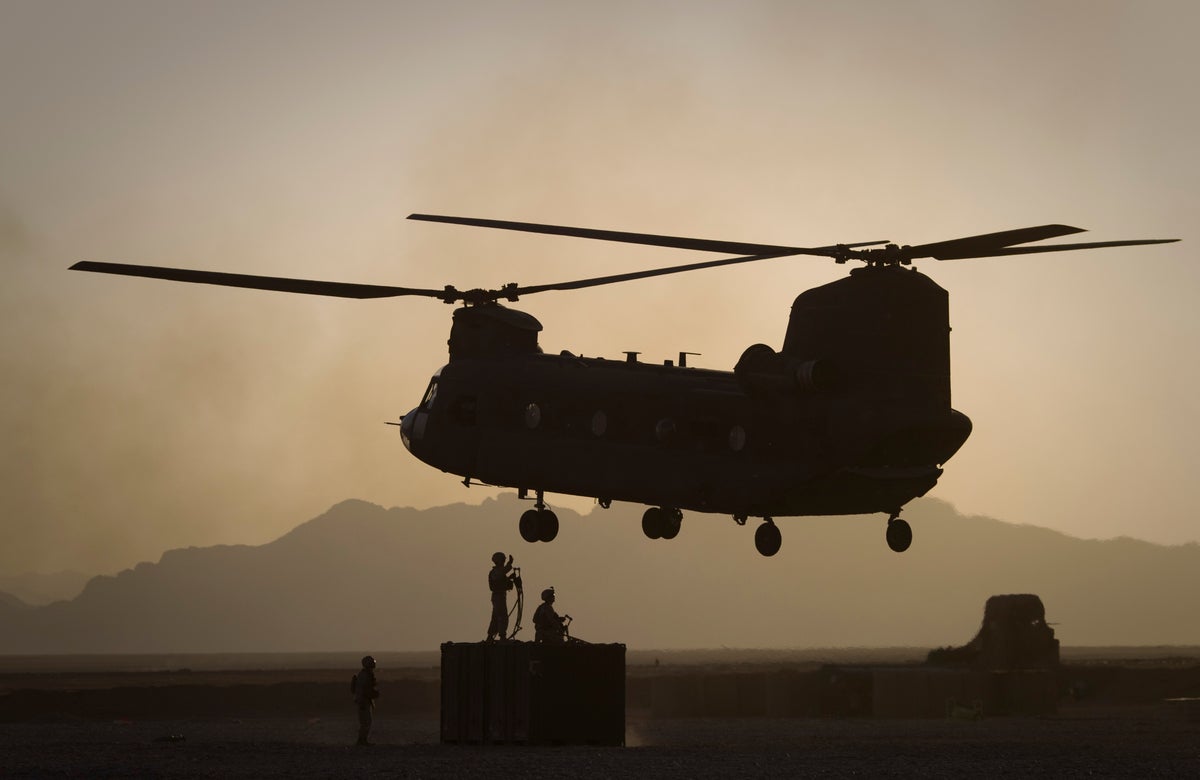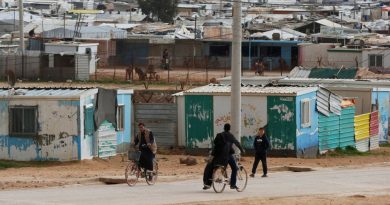My near-death was caught on film. Yet veterans like me still face silence from those in power
For a few seconds after the Taliban sniper round landed just a few inches from my head, my world plunged into darkness and everything went silent.
Fifteen years on from that brush with death, I am one of the thousands of Marines who risked their lives only to be faced with the same silence from the Pentagon and White House on Afghanistan.
Every day I remember friends I watched die in combat – including two killed a few feet away from me in an explosion in a mud hut rigged with IEDs.
Too often I get calls saying a Marine has taken their own life because the deep psychological injuries never healed.
Yet those in power are too focused on playing the blame game without taking accountability.
The Biden administration says it was Trump’s fault the 20-year war against the Taliban ended in calamity.
Now Republicans have had to threaten Secretary of State Antony Blinken with contempt of court charges – because he won’t hand over damning internal documents on the withdrawal.
No one will own up to their faults in the conflict that cost the American taxpayers $2 trillion.
While those with cushy government salaries dance around the destruction they have caused – I have still not been medically retired.
I can’t get full benefits, even though the Marines declared me 100% disabled from the three traumatic brain injuries I suffered in that mud hut explosion in Marjah.
The Purple Heart on display in my home is the small recognition the military has given me for my injuries.
It is a slap in the face that hits harder than the thump when I fell to the floor during that ferocious firefight in Helmand Province in 2008.
When I was thrown back by the power of a Dragunov rifle in the hands of the insurgent, all I wanted to do was grab my rifle, get back up and fight.
The Marines around me – baffled I had escaped without a scratch – held me down on the stretcher carrying me away.
As I composed myself, I turned to the laughing Reuters photographer sitting beside me. He showed me the photos that cemented my place in the American legacy of the War on Terror.
At the time, all I wanted to was kill everyone responsible for 9/11. In hindsight, I ask what I and my brothers were fighting for in the end.
The corrupt Afghanistan government we tried to support collapsed. The local soldiers we trained threw in the towel as soon as Kabul was surrounded by the Taliban and gave up without a fight.
The 2,378 Americans lost over 20 years has materialized into an arsenal of weapons left for the men who spent two decades trying to kill us.
At the time, the photos of my brush with death were seen as iconic.
They were shown on TV screens and published in newspapers across the country to show the bravery of the men and women sent to obliterate those behind 9/11.
Now, the images that first come to mind when we think of Afghanistan are those of the desperate men, women, and children trying to flee a country before it was thrown back to the tyranny of 20 years before.
They are the images of dead bodies lining the streets around Kabul International Airport after the suicide blast in August 2021 and the photos of the American-flag draped coffins of the 13 service members killed in Kabul displayed in a hanger at Dover Air Force Base.
When I see how quickly the country I served four deployments deteriorated when the final troops withdrew, I am filled with rage.
When I get a call saying another one of the Marines I fought alongside took their own life because they were crippled by PTSD and didn’t get the care they needed, I am filled with anger.
Fifteen years on I reflect by lighting up my fire pit, pulling out a cigar, and pouring a Scotch while my wife Bobbie leaves me alone in our backyard.
I think about a few hours after that photo was taken when I held the hand of a 19-year-old Marine as he took his final breaths after being shot in the head.
I think about the two men who were killed two years later in the IED blast in Marjah and the PTSD that ended my combat career that began months after the Twin Towers came down.
Every year, I go to visit one of their graves in a quiet cemetery in Pennslyvania.
Most in power want to make Afghanistan a distant memory and wash their hands of any accountability.
Proper care for veterans has become a mere negotiating tool for Democrats and Republicans on Capitol Hill.
I am determined to make sure their legacies live on. And I am determined to make sure those veterans who are still struggling know they are not alone.
My PTSD is better than it was, and the flashbacks and violent rages that terrified my wife Bobbie come less frequently.
But finding a way to adapt to civilian life didn’t come without me reaching the lowest points of existence.
Moments when I thought there was no point in carrying on.
I remember when Bobbie said to me: “If you want to be miserable all the time, then you can be miserable by yourself.” She left and I thought she would never come back that.
That’s when I decided to write her a letter saying I was sorry, text my friends saying my marriage was over, and raided the liquor cabinet to find two bottles of Milagro tequila.
I had seen Marines die from alcohol poisoning, so I thought it would be an easy way out.
I drank each bottle as fast as I could until I passed out. I woke up with my head strapped to the fridge with duct tape and a neighbor adjusting the IV drip in my arm.
He and Bobbie had found me just in time to save my life.
The Veterans Administration is woefully inadequate at screening for brain injuries like mine, which is why I had to seek help elsewhere.
It is part of the reasons suicide still plagues the military. I saw my brothers die in combat, now I dread the calls telling me another Marine has taken their own life because they couldn’t take it anymore.
Almost half a million veterans have brain injuries, but a report recently showed the Department of Defense has no idea how many are being treated or how they are doing.
They are the invisible injuries of war with scars so deep they may never be healed.
In June 2020 – a decade after leaving Marjah – one of the Marines who fought alongside me on that fateful day and spent years grappling with the anguish, took his own life.
He was 37 years old, with a wife and a seven-year-old son. He wasn’t the first who decided life was too much, and he won’t be the last.
At that moment in 2008, I became part of the legacy of the War on Terror. It’s a legacy that has and will keep ruining millions of lives.
Sgt Bill Bee is the Marine in one of the defining photos from the War on Terror. He wasn’t wearing a helmet or Kevlar vest when a Taliban sniper round hit a wall inches from his head in Helmand Province, Afghanistan in 2008. Sgt Bee’s memoir, The Shot, can be ordered here.





